MARVELOUS AND THE BLACK HOLE: Healing And Hope Know No Bounds
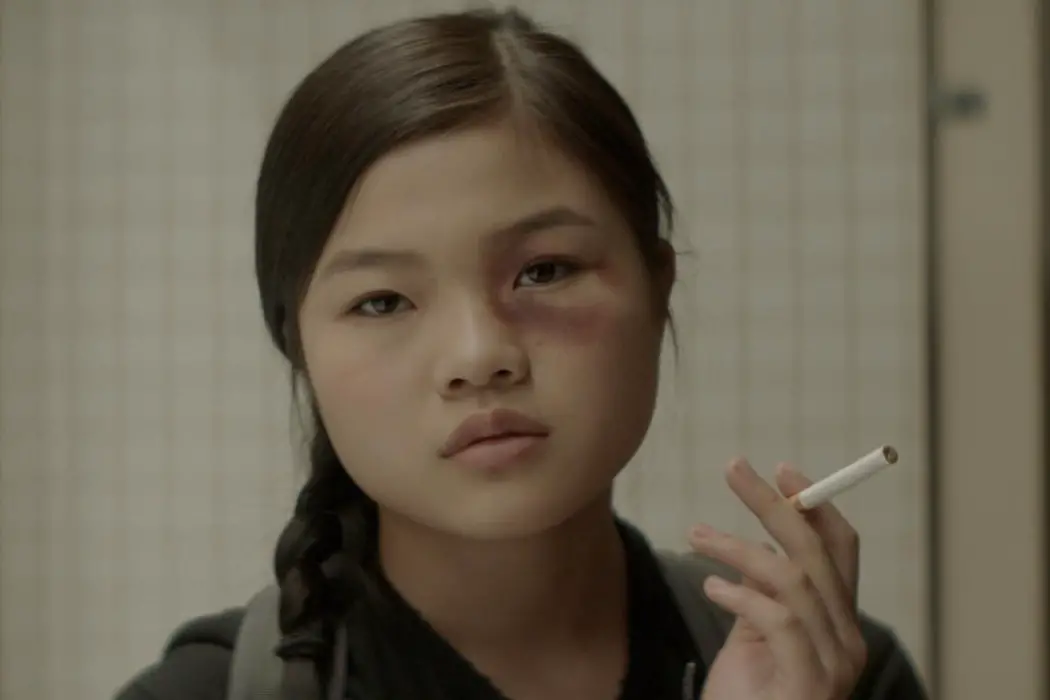
Stephanie Archer is 39 year old film fanatic living in…
Teen angst films come with their highs and their lows, many times facing the challenges of not only capturing the spirit of a moment but broadening its translation to a wide-reaching audience. And while some find more success than others, Kate Tsang‘s Marvelous and the Black Hole stands as a testament to how it’s down. Led by the dynamic Miya Cech and comedic lightheartedness of Rhea Pearlman, Marvelous and the Black Hole is a coming-of-age angst teen comedy the genre didn’t even know it needed.
Marvelous and the Black Hole does not find its angst in your typical coming of age dilemmas, much of Sammy’s (Miya Cech) emotional and psychological state is rooted in grief. Following the death of her mother, Sammy, and subsequently, her sister, have struggled to move on in her absence, each adopting their own methods of coping and self-soothing. As the magic of healing and hope unfolds, Marvelous and the Black Hole will be a film you never want to leave.
Engaging Opening
The film opens with Sammy, a black eye and a defiant glare hypnotizing her audience. Cech is immediately engaging, her Sammy’s anger and grief pouring out of the screen into the audience. As viewers attempt to understand how she ended up in this predicament, Marvelous and the Black Hole switches between chaotic and consequential, punk comedy meeting an at wits end father (Leonardo Nam) who is at a loss on how to help his daughter. As he states, they are still adjusting.
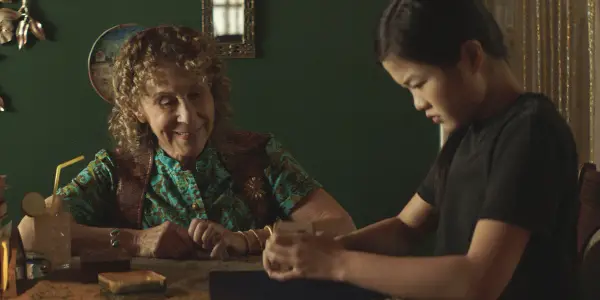
As we come to quickly understand, Sammy’s anger and grief have manifested into destruction, both of property and herself. As audiences are comprehending Sammy’s in-your-face demeanor, it also begins to develop the environment around her, Tsang brings viewers to the family table. As they share a dinner, where conversations between family typically fill the room, it is only her sister Patricia’s (Kannon) voice, her seemingly upbeat obsession with a fantasy game contrasting the dire faces of Sammy and her father.
Cutting through the incessant updates surrounding the game, Angus announces that Sammy has run her course into two remaining options. For the summer, he has registered her with the local college, “Intro to Small Business”, the expectations for good grades and good behavior higher than ever. Should she not meet these expectations, she will be sent away to Camp Sparrow – a last resort for troubled children. Though his threats are met with defiance, Sammy walks out of class, refusing to pick a business to create and present at the end of the session. Enter Margot.
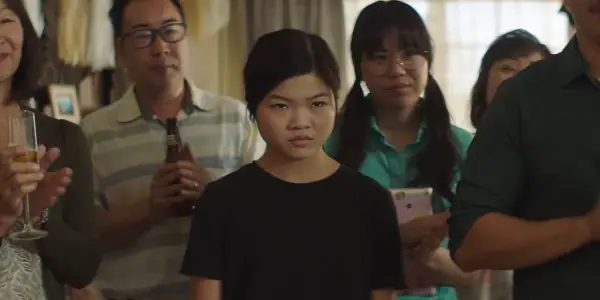
As Sammy does all she can to avoid her class, responsibility, and her own grief, Margot (Rhea Pearlman) enters her life. Margot, aka “Marvelous”, is a local magician who finds the strength of her own story in her magic, bringing warmth and mystery to the children she is hired to entertain. Though like any good magician, she can see into the heart and souls of others – especially those who emulate her. As she slowly begins to take Sammy under her wing, the illusion of magic becomes a reality.
The Magic of Cinema
The magic of cinema can easily be debated. Is it the entirety of the project? The special effects? The story? For Marvelous and the Black Hole, it shines both in its entirety and in its story. This is a film that excels in the details, never going over the top, but unafraid to go just one step further. As viewers watch Sammy work through her grief, we are also allowed to see the struggles of those around her. While we watch her father struggle with the happiness a new future could provide and the struggles of his daughters, primarily Sammy, you see his own guilt and grief in moving on. The constant struggle to fulfill both his life and the lives of his daughters weighs heavily, especially with a high-demand job challenging the distance, isolation, and lack of communication that has become the norm.
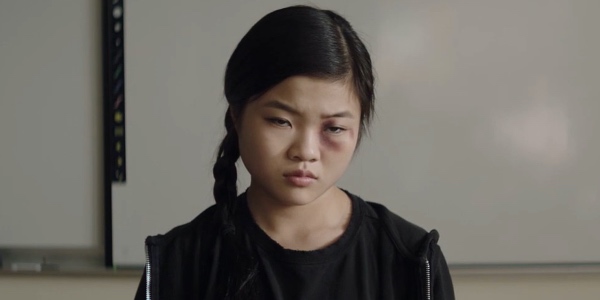
Patricia is introduced to viewers as animated, the love of her game seemingly innocent. It is not until it’s mentioned every time we see her that viewers realize this is how she has come to deal with her grief. Fantasy stories were a part of both Patricia and Sammy’s childhood, their mother providing a plethora of fairy tales to fill their nights. Where Sammy went outward with her grief, embracing destruction, Patricia turned inward, encircling herself with the fantasy the game was able to recreate for her. But it is not only the game that speaks to the grief of both sisters.
As time progresses in the film, Sammy and Patricia wear clothes that speak to their place in their grief. Patricia’s clothes are bright colors, almost fantastical in their own right. For Sammy, her black shirt and khaki shorts emulate the darkness she struggles with. But it is not only the construction of their wardrobe but their application and repetition as well. While more so for Sammy, both she and Patricia are given a limited wardrobe, the same outfits repeated time and time again speaking to how stuck in their grief they have become. Neither is able to move forward, each is struggling with accepting a change. Both are communicating through what they wear, as well as their actions and their interests.
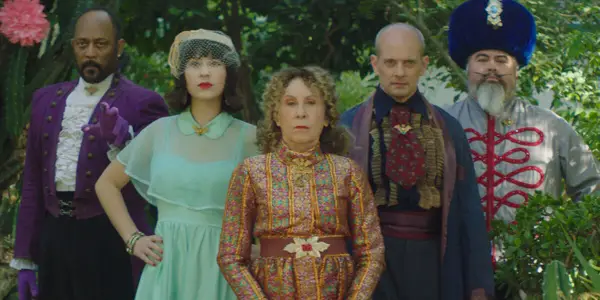
For Marvelous and the Black Hole, its magic is brought to life in its performances. Cech is the heart and soul of this film. She is dynamic, engaging, and committed. There is a relatability that oozes from her performance, welcoming a broad audience to feel both with her and for her. Cech conjures an immense amount of empathy and compassion for her character, even in her darkest moments. I honestly could not get enough of her performance, wishing to spend just a little more time with her and her portrayal of Sammy. Her performance is met by the lighthearted spirit of Rhea Perlman. There is a comedic calm that she is able to harness that lures both Sammy and audiences alike. Both understand the assignment put forth by Tsang, their commitment not only singularly captivating but their chemistry elevating.
Conclusion
Marvelous and the Black Hole is a film I can not recommend enough. It is as lighthearted as it is deep. As the film concludes, there is a sense that this is not a coming-of-age, but rather a character study into the magic of healing and hope – magic that knows no age. That it is never too late to embrace the spirit of hope and the power of healing. Compounding further, it challenges viewers to not only see the hope and the healing but to take a chance. Sometimes trusting those around you to help show you the way can have rippling effects that go far and wide. By embracing the magic life has to offer, you can find you are the master of your own story.
Have you seen Marvelous and the Black Hole? What did you think? Let us know in the comments below!
Marvelous and the Black Hole will be released in theaters on April 22, 2022!
Watch Marvelous and the Black Hole
Does content like this matter to you?
Become a Member and support film journalism. Unlock access to all of Film Inquiry`s great articles. Join a community of like-minded readers who are passionate about cinema - get access to our private members Network, give back to independent filmmakers, and more.













